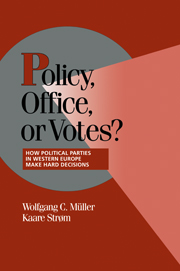Book contents
- Frontmatter
- Contents
- Figures
- Tables
- Contributors
- Chapter 1 Political Parties and Hard Choices
- Chapter 2 Office, Votes, and Then Policy: Hard Choices for Political Parties in the Republic of Ireland, 1981–1992
- Chapter 3 Party Behaviour and the Formation of Minority Coalition Governments: Danish Experiences from the 1970s and 1980s
- Chapter 4 From Policy-Seeking to Office-Seeking: The Metamorphosis of the Spanish Socialist Workers Party
- Chapter 5 Changing Strategies: The Dilemma of the Dutch Labour Party
- Chapter 6 Party Behavior in a Polarized System: The Italian Communist Party and the Historic Compromise
- Chapter 7 Decision for Opposition: The Austrian Socialist Party's Abandonment of Government Participation in 1966
- Chapter 8 Leadership Accountability and Bargaining Failure in Norway: The Presthus Debacle
- Chapter 9 Winner Takes All: The FDP in 1982–1983: Maximizing Votes, Office, and Policy?
- Chapter 10 Trade-offs in Swedish Constitutional Design: The Monarchy under Challenge
- Chapter 11 Parliamentary Rules and Party Behavior during Minority Government in France
- Chapter 12 Conclusions: Party Behavior and Representative Democracy
- Index
- Titles in the series
Chapter 10 - Trade-offs in Swedish Constitutional Design: The Monarchy under Challenge
Published online by Cambridge University Press: 05 May 2010
- Frontmatter
- Contents
- Figures
- Tables
- Contributors
- Chapter 1 Political Parties and Hard Choices
- Chapter 2 Office, Votes, and Then Policy: Hard Choices for Political Parties in the Republic of Ireland, 1981–1992
- Chapter 3 Party Behaviour and the Formation of Minority Coalition Governments: Danish Experiences from the 1970s and 1980s
- Chapter 4 From Policy-Seeking to Office-Seeking: The Metamorphosis of the Spanish Socialist Workers Party
- Chapter 5 Changing Strategies: The Dilemma of the Dutch Labour Party
- Chapter 6 Party Behavior in a Polarized System: The Italian Communist Party and the Historic Compromise
- Chapter 7 Decision for Opposition: The Austrian Socialist Party's Abandonment of Government Participation in 1966
- Chapter 8 Leadership Accountability and Bargaining Failure in Norway: The Presthus Debacle
- Chapter 9 Winner Takes All: The FDP in 1982–1983: Maximizing Votes, Office, and Policy?
- Chapter 10 Trade-offs in Swedish Constitutional Design: The Monarchy under Challenge
- Chapter 11 Parliamentary Rules and Party Behavior during Minority Government in France
- Chapter 12 Conclusions: Party Behavior and Representative Democracy
- Index
- Titles in the series
Summary
INTRODUCTION
In Sweden, the head of state (the monarch) no longer takes part in the process of government formation. It is the speaker of the Riksdag who appoints a candidate for prime minister. This candidate must be approved by the Riksdag. He or she is approved unless more than half of all members of parliament vote against the candidate. This constitutional rule was designed in the early 1970s. In this chapter I explain why the Swedish parties removed the monarch from the process of government formation and, for that matter, from most other formal functions and powers. At the heart of the explanation lie choices based on multiple goals in multiple arenas.
I focus on the parties' evaluations of available choices. The Social Democratic Party programme calls for an elected head of state (a republic). I discuss only briefly the Social Democrats' decision not to propose a republic. More interesting is the Social Democrats' decision to propose a modified form of monarchy. I also briefly present the positions of two other parties involved in the constitutional bargaining, the Centre and Liberal Parties. Of particular interest is the Conservatives' decision to accept a modified form of monarchy. This is given the most attention.
The outline of this chapter is as follows. In the next section I present the context in which the four parties reached a compromise. In the third section I present the content of the compromise and the events surrounding it. In the fourth section I explain in more detail why the Social Democrats proposed a modified form of monarchy.
- Type
- Chapter
- Information
- Policy, Office, or Votes?How Political Parties in Western Europe Make Hard Decisions, pp. 237 - 257Publisher: Cambridge University PressPrint publication year: 1999
- 1
- Cited by



